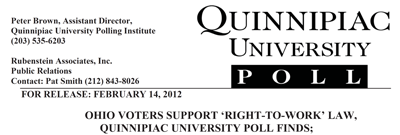Major Right to Work Victory in the Midwest
After years of intensely lobbying their elected officials and mobilizing their fellow citizens, pro-Right to Work Hoosiers saw a measure prohibiting forced union dues and fees signed into law this month. Indiana Becomes the 23rd State to Abolish Forced Union Dues (Source: February 2012 National Right to Work Committee Newsletter) Just as this edition of the National Right to Work Newsletter went to press, Indiana became the 23rd state to adopt a Right to Work law prohibiting union officials from taking money from employees' paychecks as a condition of getting or keeping a job. In the late afternoon on January 25, a 54-44 majority in Indiana's state House of Representatives stood up to taunts and threats emanating from the hundreds of union bosses and other Big Labor militants who had been crowding the halls of the capitol for hours. Consequently, H.B.1001, a measure making it illegal to fire employees for refusal to pay dues or fees to an unwanted union, was adopted and sent to the state Senate. On February 1, the Senate, which had already passed another version of the Right to Work legislation, 28-22, approved H.B.1001 and sent it to GOP Gov. Mitch Daniels' desk. Heeding the pleas of thousands and thousands of Hoosiers who passionately oppose compulsory unionism, late last year Mr. Daniels had publicly announced he was strongly in favor of making Indiana a Right to Work state. Keeping his word, Mr. Daniels proceeded to sign the Right to Work measure into law once he got the chance. Landmark Victory Comes Only After Nearly a Decade of Intense Mobilization Efforts Right to Work's Indiana victory could never have occurred without many years of careful preparation. In 2003, Indiana citizens who were determined to free themselves and their fellow Hoosiers from the shackles of compulsory unionism launched what they knew from the start would be a sustained, and often difficult, effort to pass a Right to Work law. Subsequently, the organization these citizens put into high gear in 2003, the Indiana Right to Work Committee, mobilized an ever-loudening drum beat of support for employee freedom and built up opposition to forced unionism in the state Legislature. Over the course of the long campaign, the Indianapolis-based Right to Work group repeatedly benefited from the counsel and experience of the National Right to Work Committee. And National Committee members and supporters who live in the Hoosier State have been the bulwark of the Indiana Right to Work campaign. This campaign undertook major mobilization efforts in the last four election cycles and secured three "unsuccessful" roll-call votes in the state House prior to last month's successful one.







